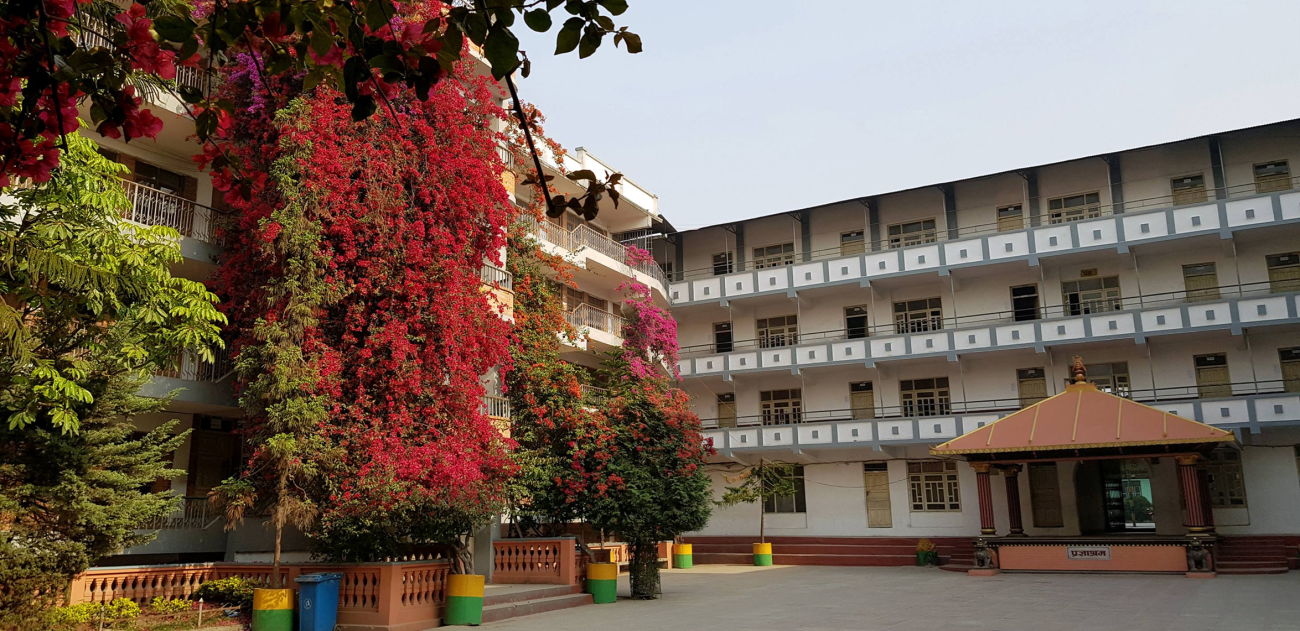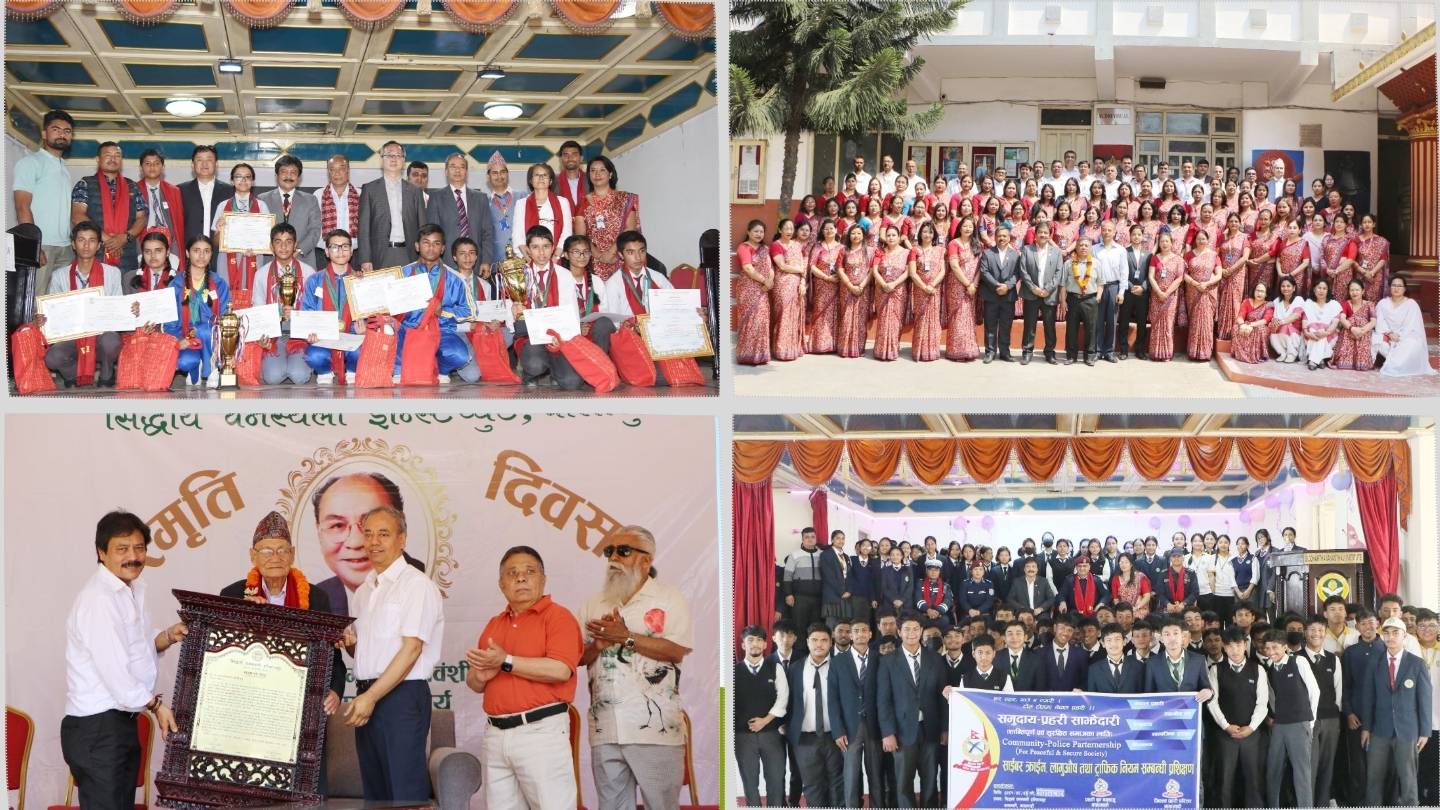Overview
Siddhartha Vanasthali Institute (SVI) in Balaju, Kathmandu, offers Ten Plus Two (+2) programs in Science and Management under the National Examination Board (NEB) and the Bachelor of Business Studies (BBS) under Tribhuvan University (TU).

Introduction
SVI grew from a local school established in the early 1950s into a multi-level institute serving secondary and undergraduate learners. The campus sits in Balaju with bus routes that connect common student catchment areas across Kathmandu and Lalitpur.
Academic delivery follows national frameworks: NEB rules for +2 and TU course structures for BBS. The institute maintains libraries, laboratories, computer and innovation labs, an audio-visual room, an auditorium, and indoor–outdoor sports spaces. A structured academic calendar and attendance policy guide classroom routines and examinations.
Quick Highlights (Summary Section)
-
Location: Balaju, Kathmandu, Nepal
-
Programs: +2 Science (NEB), +2 Management (NEB), BBS (TU)
-
School hours: Sunday–Friday; hours vary by level as published by the institute
-
Attendance: at least 85% to sit final examinations
-
Governance: principal-led system with level in-charges and subject coordinators
-
Facilities: library, science labs (Physics, Chemistry, Biology), math lab, computer labs, innovation labs, audio-visual room, auditorium (approx. 500 seats), sports courts
-
Transport: institute buses on major routes of Kathmandu and Lalitpur
-
Admission: GPA and subject grade thresholds, entrance test, and interview
-
Scholarships: SEE merit, internal merit competition, and recognition for select international ECA achievements
Academic Programs Offered
Ten Plus Two (+2) Science (NEB)
The +2 Science stream prepares learners for higher study in science and technology. Students choose from:
-
Physical Science: Physics, Chemistry, Mathematics
-
Biological Science: Physics, Chemistry, Biology
Teaching includes concept lessons, guided practice, and practical work in dedicated labs. Lab sessions focus on safe handling, observation, and reporting. Regular class tests and terminal exams track progress, and teachers provide feedback to build exam skills.
Learners commonly continue to medicine, engineering, pharmacy, agriculture, and data-oriented fields. Some pursue scholarships and standardized tests after +2. The combination of theory classes and routine practicals supports the skills these paths require.
Typical Learning Features
-
Structured unit plans aligned with NEB
-
Weekly or biweekly tests and feedback sessions
-
Supervised practicals with lab notebooks and reports
-
Problem-solving workshops in physics and chemistry numericals
-
Support hours for exam preparation
Ten Plus Two (+2) Management (NEB)
The +2 Management stream introduces business foundations and quantitative thinking. Core study areas include accounting, economics, business studies, and communication. Depending on the section, learners may study business math or optional mathematics.
Practice is central to learning. Students work on ledger entries, financial statements, cost elements, and basic analysis. Internal assessments, class tests, and NEB examinations build consistency and accuracy.
Graduates often continue to BBS, BBA, BBM, hotel management, travel and tourism, or small business projects. The stream suits learners who want a steady starting point in commerce before choosing a specialized bachelor’s degree.
Typical Learning Features
-
Concept lessons with short calculation drills
-
Introductory case vignettes from local business contexts
-
Assignments on accounting cycles and basic analysis
-
Regular tests and written practice
-
Exam-oriented review classes during term cycles
Bachelor of Business Studies (BBS) — Tribhuvan University
SVI runs the TU-affiliated four-year BBS program. The course covers core functional areas such as accounting, finance, marketing, and organizational management, with specialization options in later semesters according to TU rules.
Delivery blends lectures, discussions, numerical problem-sets, and written reports. Students complete applied tasks such as basic market scans, budgeting exercises, and short project papers aligned with TU requirements. Internal tests and end-semester TU exams determine standing.
Graduates work in banks, microfinance institutions, audit firms, trading houses, service companies, NGOs/INGOs, and public service tracks. Many pursue a master’s degree in business, development, or public policy after gaining work experience.
Typical Learning Features
-
TU-aligned lesson plans and internal assessments
-
Assignment cycles that build analytical writing and numeracy
-
Exposure to local business contexts through mini-projects
-
Semester reviews and exam preparation sessions
Admission Process
SVI follows a transparent procedure for NEB and TU programs. Timelines match the national academic calendar and institute notices.
Eligibility
-
+2 Science: SEE GPA 2.0 or higher. Subject grade thresholds apply in Science and Math. English, Social Studies, and Nepali grades are reviewed.
-
+2 Management: SEE GPA 2.0 or higher. English, Social Studies, and Nepali grades are reviewed. Mathematics grade is considered according to stream selection.
-
BBS: Completion of 10+2 or equivalent recognized by a competent authority, meeting TU entry rules.
Required Documents
-
Completed application form
-
SEE or 10+2 mark sheets/transcripts and character certificate
-
Migration certificate where applicable
-
Copy of citizenship or birth certificate (as applicable)
-
Recent passport-size photographs
Selection Steps
-
Application screening against GPA and subject grade thresholds
-
Entrance examination focused on relevant competencies
-
Interview to review motivation, study habits, and program fit
Practical Notes
-
Seats are limited; early submission helps timely processing.
-
Original documents are verified; copies are kept on record.
-
Dates for entrance and interviews are shared through official notices.
Teaching Faculty and Learning Methodology
Academic work is coordinated by a principal-led team. Level in-charges monitor grade-wise delivery and discipline. Subject coordinators support lesson pacing, internal assessments, and teacher collaboration.
Classroom Practices
-
Short, focused lessons with checks for understanding
-
Guided written practice for numericals and lab reporting
-
Assignments that build recall, accuracy, and clear explanation
-
Weekly or biweekly tests and post-test feedback
-
Parent–teacher interactions during published hours
Academic Rhythm
-
As per published schedule:
-
Kids to Grade 7: about 9:35 A.M.–3:10 P.M.
-
Grades 8–10: about 9:00 A.M.–4:00 P.M.
-
+2 and BBS: as notified by departments
-
-
Attendance: at least 85% for exam eligibility
-
School week: Sunday through Friday; the last Friday may host internal activities as announced
Infrastructure and Learning Facilities
Library
The library supports course study with textbooks, references, and general reading. Students can prepare for exams, locate sources for assignments, and seek guidance from library staff on research tasks.
Science Laboratories
Physics, Chemistry, and Biology labs support practical work. Each lab keeps the apparatus and safety procedures needed for routine experiments. Students learn to observe carefully, record findings, and write concise reports.
Math Lab and Computer Labs
The math lab uses models and activities to improve concept clarity. Computer labs provide internet access for research tasks and assignments. Scheduled lab periods align with course plans.
Innovation Labs
Innovation labs give students space for project-based digital tasks, presentation work, and basic programming when relevant to coursework.
Audio-Visual Room and Auditorium
The audio-visual room hosts multimedia classes and screenings tied to subjects. The auditorium (about 500 seats) holds orientations, seminars, cultural events, and award functions.
Sports and Outdoor Areas
Facilities support basketball, football, table tennis, and badminton. Inter-house events and practice sessions encourage fitness and teamwork.
Transport
Institute buses operate on major routes in Kathmandu and Lalitpur. Riders carry bus passes and follow transport rules.

Student Life and Campus Experience
Daily routines focus on punctuality, classroom focus, and respectful conduct. Uniform guidelines apply across levels, and students carry identity cards on campus. Writing on walls, property damage, and misconduct face disciplinary action.
Parents are welcome to meet level in-charges or teachers during official hours to discuss progress. Cleanliness drives, assemblies, and class meetings help keep a tidy campus and informed student body.
Uniform Overview
-
Grades I–V: white shirts with blue stripes; grey trousers/skirts; navy pullover; black shoes; grey socks; scarf
-
Grades VI–X: white shirts with blue stripes; grey trousers/skirts; navy blazer; black shoes; grey socks; tie
-
House uniform with white canvas shoes and socks when scheduled
Extracurricular Activities (ECA)
Clubs and activities complement classroom study and build confidence.
-
Science clubs and project displays
-
Debates, public speaking, and writing events
-
Art workshops and exhibitions
-
Sports meets and inter-house tournaments
-
Cultural programs during the academic year
-
Field visits linked to science, management, and social studies
Participation is recorded by the ECA team or level in-charges. Notable district, national, or international outcomes are recognized in assemblies and institute programs.
Scholarships and Financial Support
SVI provides scholarship pathways according to published rules:
-
SEE merit scholarships based on grades
-
Merit awards via internal competitive exams among top performers (top three gain one academic year of support)
-
Scholarships for students with internationally recognized achievements in select extracurricular fields
Award continuation depends on academic standing and discipline. Details are shared during admission briefings and via official notices.
Achievements and Institutional Milestones
SVI’s origin traces to the early 1950s in Balaju, when school education in Nepal was in a formative stage. Over time, the institute expanded its levels, upgraded facilities, and adopted new curricula to meet national standards. A major development was the merger of Siddhartha English Boarding School with Vanasthali Vidhyashram in the 1970s, after which the institute operated as Siddhartha Vanasthali Secondary School and later introduced higher secondary and bachelor-level programs as Siddhartha Vanasthali Institute.
The late Laxman Rajbanshi played a key leadership role during a difficult period and received national honors such as Gorkha Dakshin Bahu (multiple classes), Trishakti Patta (multiple classes), and a National Education Award with a Certificate of Appreciation from the Ministry of Education. He served as Advisor to the Minister of Education, Culture, and General Administration in 1990 and contributed to the National Education Commission.
Academic results, disciplined routines, and regular practicals have been part of the institute’s approach for many years. The campus has also hosted sports and cultural programs that reflect the social and educational life of the community.
Why Choose This Institution?
-
NEB +2 Science and Management, and TU-affiliated BBS under one institute
-
Library, labs, innovation spaces, audio-visual room, auditorium, and sports areas
-
Structured academic routines with clear rules and regular assessments
-
Level in-charges and subject coordinators for oversight and support
-
Attendance policy that promotes steady classroom engagement
-
Scholarships for merit and select international ECA recognition
-
Bus services across common routes in Kathmandu and Lalitpur
Conclusion
SVI offers +2 Science, +2 Management, and TU-affiliated BBS within a stable academic setup in Balaju, Kathmandu. The institute follows national curricula, runs regular assessments, and supports learning through labs, library access, and campus activities. This profile lists program options, admission steps, scholarship types, facilities, and governance features to help families and auditors review the essentials.
For program-wise course lists, fee tables, calendars, or policy updates, refer to the latest official notice issued by the institute, NEB, or Tribhuvan University.
Contact Siddhartha Vanasthali Institute's administrative office for detailed information on the course, admissions, location, fees, scholarships, facilities, counseling or eligibility.
Contact Details
Siddhartha Vanasthali Institute
Email Address: svibalaju@gmail.com
Phone Number: +977-1-4350884, +977-1-4350075
Website: https://svi.edu.np
Location: Ring Road, Balaju, Vanasthali, Kathmandu, Nepal

















